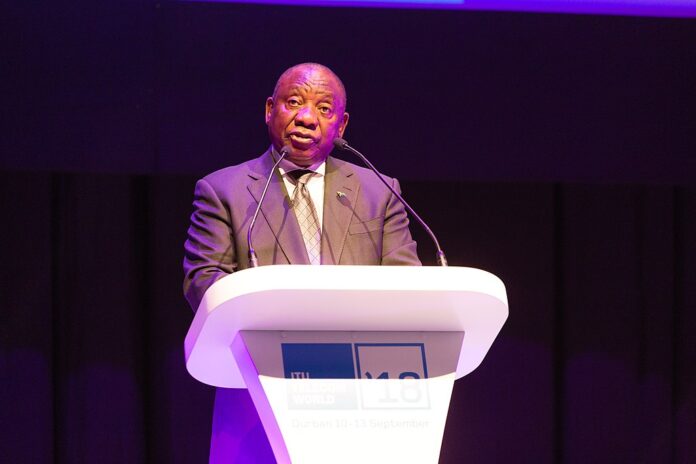A landmark coalition between the ANC and opposition parties sees Cyril Ramaphosa retain the presidency amid high political drama
Cyril Ramaphosa was re-elected as South Africa’s president in a dramatic session of parliament, following a groundbreaking coalition deal between the governing African National Congress (ANC) and several opposition parties. This new government of national unity unites the ANC with the centre-right Democratic Alliance (DA) and smaller parties, marking an unprecedented political collaboration.
In his victory speech, Ramaphosa celebrated the coalition, emphasizing that voters expect their leaders “to act and to work together for the good of everyone in our country.” The agreement, concluded after weeks of speculation and intense negotiations, allowed Ramaphosa to maintain his position despite the ANC losing its parliamentary majority for the first time in 30 years. The ANC secured 40% of the vote in last month’s elections, with the DA coming in second with 22%.
Fikile Mbalula, the ANC’s secretary-general, described the coalition as a “remarkable step.” This alliance enables Ramaphosa, who became president and ANC leader in 2018 after a fierce power struggle with Jacob Zuma, to continue his leadership. The next step for Ramaphosa is to allocate cabinet positions, which will now include members from the DA.
Notably absent from the coalition are two ANC breakaway parties, which could gain support if the new government fails to address the economic challenges facing South Africa. However, opinion polls indicate that many South Africans hope this grand coalition will succeed.
In his address to parliament, Ramaphosa reflected on the ANC’s historical victory in 1994 when Nelson Mandela became president, uniting the country and promoting reconciliation. He urged lawmakers to draw inspiration from that period as they move forward.
The coalition between the ANC and the DA is unprecedented, given their long-standing rivalry. The ANC, under Nelson Mandela, led the fight against apartheid and won South Africa’s first democratic elections. The DA, often accused of protecting the economic interests of the white minority, denies these charges.
John Steenhuisen, the leader of the DA, called the day “historic” and a “new chapter” for South Africa. The National Assembly also appointed an ANC member as speaker and a DA member as deputy speaker.
Julius Malema, leader of the Economic Freedom Fighters and a former ANC member, accepted the election results but criticized the coalition. He called it a “marriage of convenience” meant to consolidate “white monopoly power” over South Africa’s economy.
Analysis:
Political:
The re-election of Cyril Ramaphosa through a coalition deal with the DA and other smaller parties represents a significant shift in South African politics. This coalition, born out of necessity after the ANC lost its parliamentary majority, highlights a move towards more inclusive governance. It signals a potential new era of political collaboration in South Africa, aiming to address the nation’s pressing issues, such as corruption, unemployment, and crime. Ramaphosa’s ability to navigate this coalition will be crucial for maintaining political stability and implementing effective governance.
Social:
Socially, the coalition between the ANC and DA symbolizes a step towards bridging historical divides in South Africa. This collaboration might foster a more inclusive political environment and encourage cooperation across traditional party lines. However, it also raises questions about the long-term sustainability of such alliances, given the parties’ ideological differences. The success of this coalition could set a precedent for future political strategies, promoting unity and cooperation over partisan conflicts.
Racial:
The coalition’s formation highlights ongoing racial tensions and the challenges of overcoming apartheid’s legacy. The ANC’s inclusion of the DA, often criticized for defending white economic privileges, may raise concerns about the coalition’s ability to address racial disparities effectively. Ramaphosa’s leadership will be tested in balancing these dynamics and ensuring that the coalition delivers on promises of economic and social justice for all South Africans.
Gender:
Gender issues, although not at the forefront of the coalition’s immediate agenda, remain a critical area for the new government to address. Ensuring equal representation and opportunities for women in the new administration will be essential for promoting gender equality. The coalition must prioritize policies that tackle gender-based violence, support women’s economic empowerment, and foster a more inclusive society.
Economical:
Economically, the coalition faces significant challenges, particularly in addressing unemployment, poverty, and inequality. The partnership between the ANC and DA offers a unique opportunity to blend different economic policies and strategies. If successful, the coalition could implement comprehensive reforms to stimulate economic growth and improve living standards. However, failure to deliver tangible economic improvements could lead to political instability and increased support for opposition parties.
